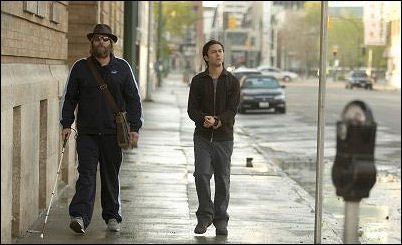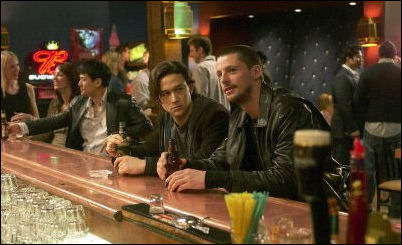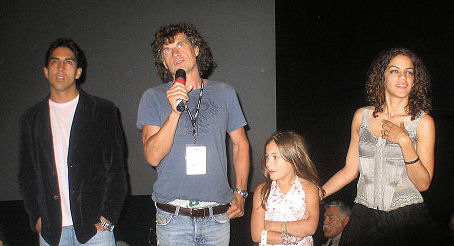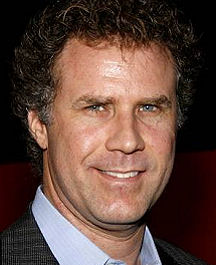A brilliant review by the Toronto Star‘s Geoff Pevere of Ken Loach‘s The Wind That Shakes The Barley, a sobering drama about the terrible price paid by Irish militants in their battle against British troops in the early 1920s. Pevere compares what Loach is saying about violent means — “when it comes to deciding to kill, there is no end” — to the traditional American six-shooter philosophy that “violence is a reasonable means to a justified end — especially if it pre-empts or avenges other forms of violence.”
Day: March 25, 2007
Jamie Stuart vs. Paul Verhoeven
The great Jamie Stuart‘s latest video piece is an arch, goofball-satiric interview with Black Book director Paul Verhoeven. A female voice-interviewer, an audience-reaction soundtrack and a dash of canary-yellow animation have replaced Stuart’s trademark angst and ennui and lonely-guy gloom. In short, a startling stylistic departure.
“The Lookout” review
Scott Frank‘s The Lookout (Miramax, 3.30) has some good things going for it. Jeff Daniels‘ performance, for one. The dialogue, the craft and the care that went into it, and the snow and the slush covering the dreary Midwestern locales. But it’s largely about a young brain-damaged guy (Joseph Gordon-Levitt) dealing with hunger and temptation, and I think life is brutal and exhausting enough without having a brain injury to contend with, and I just decided early on I didn’t want to go there. Sorry, but I spook easily.

Jeff Daniels, Joseph Gordon-Levitt
A lot of care and craft and particularity went into The Lookout. It’s nicely sculpted (for what it is), feels well-drawn, has several solid performances (Bruce McGill‘s excellent paterfamillias is another standout) and so on. It was obviously made by a high-end pro who knows how to write snappy, down-to-it dialogue, but the only actor I wanted to hang with was Daniels. He plays a very smart low-rent character with spot-on seasoning and a perfect sense of emphasis. The kind of dumb-ass who knows more than he lets on.
The Lookout is primarily about some low-rent losers embarked on a nefarious scheme to score big dough — a bank job that you know is going to fail because they’re not smart or lucky enough. It’s obviously Fargo-esque in its frequent use of bleak, snowy backdrops as well as the lower-middle-class, criminal-class, upper-class mixture.
Scott wrote the Lookout script well over ten years ago. Sam Mendes was going to direct it (signed on before American Beauty was released), then David Fincher. Michael Mann flirted with it briefly before Frank decided he didn’t want to rewrite it again for another director.
“It was always a small mood piece in my mind, based on someone I knew,” Frank said a couple of weeks ago. I didn’t know how to write about him until I read this piece about these shitty little banks in these tiny towns that sometimes have millions of dollars in the vault for a couple of weeks twice a year, during harvesting and pre-planting seasons.
“I went to these towns in Kansas and you see how empty they are at night. How easy it would be to simply blow up the bank and walk in and walk out with the money! Suddenly, I had this notion of locating this character I had been thinking about in the middle of a thriller and it just went from there.”
I was bothered, frankly, by the bank set-up — all that glass, all those lights, all that exposure. Anyone could have seen those guys doing what they were doing. When a bank job is happening I want the thieves to do the job right and get away, and my thought from the beginning was that the whole place is way too visible and overlit.
Frank had to know that people would compare it to Fargo. If I’d been in Frank’s shoes, knowing full well that I was playing on the same football field as Fargo, I would have gone all the way and written it for dark sardonic laughs all around, like the Coens did. Why not? People are going to Fargo you anyway. When I mentioned this to Frank, he said that a Fargo-like tone “just wasn’t in my head. I wanted something emotional. Maybe I didn’t succeed, but I really wanted a thriller that had some modicum of emotion to it.”
I was impressed by Matthew Goode‘s attempt to get away from the cute and dapper English gentleman stuff that he did in Match Point by playing a low-rent psychopathic thug. But deep down I’m sensing that he really is that guy in Match Point (or a close relation) and that he may as well accept it.
The Matter of Joseph Gordon-Levitt
There’s a profile of Joseph Gordon Levitt, the star of Scott Frank‘s reasonably engrossingThe Lookout (Miramax, 3.30) in today’s N.Y. Times. In it, Franz Lidz declares that Gordon-Levitt’s performance of Chris Pratt, a brain-damaged janitor, is what “really moves this bank heist thriller along.”

Lookout star Joseph Gordon-Levitt (l.), costar Matthew Goode (r.)
“Chris is a promising high school hockey player whose daredevilry causes a fatal car crash, killing his friends and leaving him with little in the way of short-term memory,” Lidz writes. “Gordon-Levitt fashions him into a still but soulful character, lost yet somehow self-possessed.”
I saw The Lookout three or four weeks ago, and I ‘m sorry to lob a paint balloon at a film that needs all the help it can get, but I found Gordon-Levitt’s character frustrating as hell to spend time with. To me, he seemed lacking in self-possession and way too still for my viewing comfort. In the Times piece Frank calls Gordon-Levitt “one of the two or three greatest actors in his age group,” and costar Jeff Daniels says “there’s a mystery and a privacy to what goes on in Joe’s head…we can see him work through his thoughts. We can almost hear him.”
I really don’t get this. I think Gordon-Levitt is woefully inexpressive. To me, he lives in a little mood house, a house defined by that half-sensitive, half-hurting but mostly deadpan “look” with the frown and the very slightly Eurasian (i.e., island-Hawaiian?) dead-brown eyes. He walked through Brick with that look. He walked through Shadowboxer with that look. And he walks through The Lookout with that look. One way to be a captivating actor, I realize, is to do very little and do it extremely well. Gordon-Levitt has proven, I think that this approach doesn’t necessarily work.
And I hated the driving scene in the beginning. I can’t stand actors who drive and spend a good 50% of the time looking at the person they’re talking to in the passenger seat. You really do have to watch the road when you’re driving — you can kill someone if you don’t. Anyone who ignores that simple reality forfeits all respect and affection from this corner. Gordon-Levitt is worse — he spends 55 to 60% of that driving scene staring at the pretty blonde riding shotgun plus another 20% looking at the sky and the fireflies — the guy literally looks at the road for 20% of the time. It’s infuriating.
And on top of this he turns the lights off. Death wish! Moron! I didn’t just write his character off because of this — I wrote Gordon-:Levitt off, and as fast as I’m concerned he’s not getting back in for a long time. Unless, that is, he delivers an extraordinary rock-out performance down the road, in which case all is forgiven.
Praise for G.I. Jesus
Carl Colpaert‘s G.I. Jesus, which I saw and mostly raved about last summer during my visit to Cinevegas, is playing (barely) in Los Angeles right now, and it will open in New York City on 4.6. When a film doesn’t open with the usual promotional ad push there’s a tendency to assume it’s got problems and isn’t worth catching. Well, it’s not a note-perfect film (I had some issues with two or three aspects) but G.I. Jesus is absolutely worth seeing.

(l. to r.) G.I. Jesus costar Joe Arquette, director-writer Carl Colpaert, costars Telana Lynum and Patricia Mota following a showing of the film at Cinevegas last June
I called it “a partly real, partly hallucinatory homecoming story” told from the perspective of an obviously intelligent young Mexican-American Marine Corporal named Jesus Feliciano (Joe Arquette) who’s haunted by his actions during his time in Iraq. The film is basically about ghosts from that conflict hovering around Jesus, and a growing feeling of betrayal and apartness between himself and his “Dominican princess” wife Claudia (Patricia Mota), whose materialistic ambitions seem, from his perspective, to be creating a gulf between them.
I called G.I. Jesus “is the first truly exceptional Cinevegas film I’ve seen so far” and that “compared to the pickings [at the festival] so far, this psychological domestic drama almost feels miraculous.” But I’d like to be politely clear on my “unquestioned triumph” quote in those ads that just went up today.
What I said, to put a point on it, is that the film “is an unquestioned triumph in the matter of Arquette and Mota’s performances. I believed every word and gesture from these two; everything they say and feel seems genuine.”
Reporter on its knees
Woe to the shell-shocked Hollywood Reporter with the news of yet another defection — film business editor Nicole Sperling is leaving to report for Entertainment Weekly out of its L.A. office. Said it before, saying it again — if the Reporter wants to really save itself and not just apply this or that band-aid procedure, it should hire/buy out David Poland and the Movie City News team (a move that Poland himself suggested a few weeks ago). If this happens MCN will be obliged to sublimate its identity as well as its style of writing and reporting to theTHR tradition and also submit to the political checks and balances hanging around that enterprise like an albatross, and this in turn will allow Hollywood Elsewhere to step in like John Wayne and reap the benefits of the resulting online vacuum.
Former THR columnist (and current Variety staffer) Anne Thompson has written that the Sperling departure “leaves yet one more hole for publisher John Kilcullen to fill, and will not help sagging morale at THR‘s Wilshire offices. Kilcullen is already looking to find a new editor to replace Cynthia Littleton, who starts at Variety on Monday. And film editor Gregg Kilday, who finally hired tech writer Carolyn Giardina to replace Sheigh Crabtree after she went freelance (she’s under contract at the L.A. Times, which ought to put her on staff), will now be looking to fill two film department slots.”
Levine on comedians + drama
In another piece about comedians trying their legs at drama (i.e., on the heels of Caryn James‘ 3.25 N.Y. Times article), MSNBC’s Stuart Levine begins his version thusly: I’m very excited to see the new Adam Sandler movie, Reign Over Me, for one big reason: It’s not an Adam Sandler movie.
“In other words, this one’s not geared for 12-year-old boys who’ll collapse in laughter at the sight of any and all bodily functions. Reign is for adults (the story centers around a man trying to deal with the grief of Sept. 11) and I credit Sandler for stepping out of his financial wheelhouse for a chance to do something that won’t be nominated for a Nickelodeon Kids’ Choice Award.”
Except Levine doesn’t say anything the least bit descriptive about Sandler’s Reign performance. For this you have to go back to James, to wit:
“There is also something endearing about Sandler’s character, an empathetic quality that comes from the actor, not the role. He looks like the young Bob Dylan rather than a guy too distraught to get a haircut, and gives a two-note performance (near catatonic with a late explosion of grief), yet even here Mr. Sandler displays the appealing everyman persona and ability to hold the screen that he carries to all his films.”
Ferrell and Perlman
N.Y. Times columnist Caryn James is on probation with an ankle bracelet for having gone sweet on Will Ferrell, the world’s dorkiest-looking and, I feel, the most monotonous and not-all- that-funny comic performer around today. I’m feeling this more acutely than usual because of the impending Blades of Glory (Dreamamount, 3.30), which I’m dreading like the plague even though it’s going to wail at the box-office five days from now.


Will Ferrell, Ron Perlman
I know what the Will Ferrell treatment is all about, and I’ve been wanting a break from it since he did that cameo in The Wedding Crashers. (I haven’t really and truly enjoyed the guy since the days of his George Bush impressions on SNL.) Plus I’m starting to feel more and more turned off by the New Homophobia (straight comedians getting laughs by pretending to be passionately gay while alluding fifteen ways from Sunday that having anal sex with another guy — be it a girlish blonde like Jon Heder or an ape with hairy legs and a five o’clock shadow — is a fate worse than death, or roughly akin to getting nailed by a smelly horse), and it’s quite clear that Blades of Glory is mired in this attitude up to its ears.
James actually states that Ferrell gave “one of last year’s most affecting performances” in Stranger Than Fiction, and that he makes the character of Harold Crick, an I.R.S. agent who hears a woman’s voice narrating his life, “a sweet, believable, heart-tugging guy.” James is a irst-rate writer and well within her rights to say this, but my knee-jerk reaction to these words was “aaaahhhh, God!”
Ferrell’s face “is often still, but you can see the thoughtfulness in his eyes,” she explains. (Ferrell actually delivers the same double-track element in all his performances, which is to project exceptional uptown intelligence that is nonetheless dominated by a bone-dumb, cement-head yahoo mentality.)
“His small facial expressions and underplayed delivery,” writes James, “become extremely funny as he registers surprise at the absurdity of his situation, then quiet, quizzical acceptance.” (Okay, this worked in Stranger Than Fiction…I’ll give him that.)
“This astute realism is not at all divorced from his comedy,” James goes on, adding that Ferrell “may be the best actor” among a group of funny guys — Adam Sandler, Jim Carrey, Bill Murray — who’ve ventured into big-screen drama.
The fact is that Ferrell, however brainy or perceptive he may be in actuality, is ruled by a certain facial-ness that shouts out Quest for Fire and features that resemble no other actor as much as the great and widely respected Ron Perlman. There’s nothing wrong with looking like Perlman in any way, shape or form, but it you lack the soul and the sadness that Perlman can convey at the drop of a hat, and you have the same kind of beady, close-together eyes and a somewhat similar overhanging forehead, you end up exuding a certain oppressive doofusness. Which is to say that servings of this over and over and over have led me (and I suspect, thousands of others) into a kind of stupefication.
